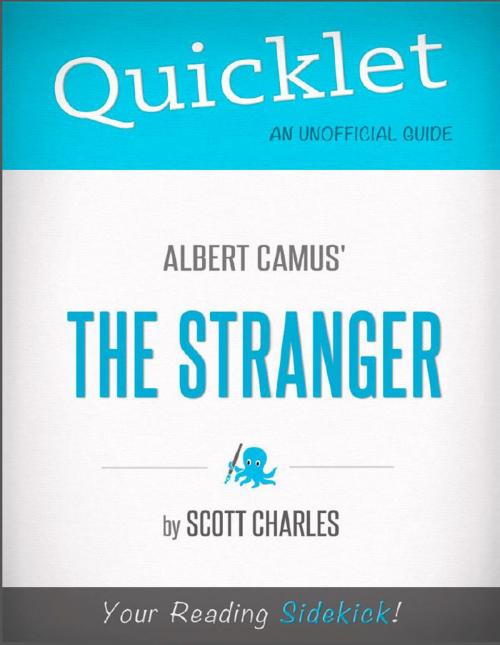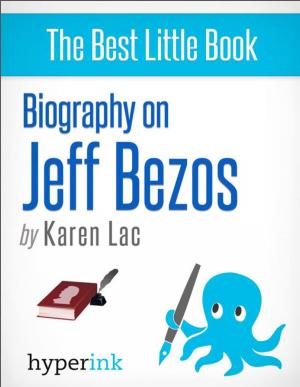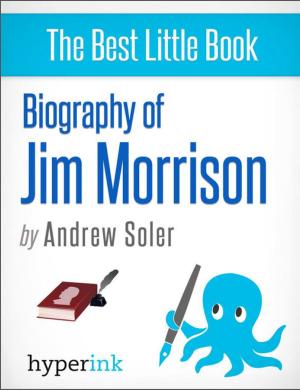Quicklet on Albert Camus' The Stranger (CliffNotes-like Summary and Analysis)
Fiction & Literature, Literary Theory & Criticism, Reference| Author: | Scott Charles | ISBN: | 9781614646433 |
| Publisher: | Hyperink | Publication: | July 30, 2012 |
| Imprint: | Hyperink | Language: | English |
| Author: | Scott Charles |
| ISBN: | 9781614646433 |
| Publisher: | Hyperink |
| Publication: | July 30, 2012 |
| Imprint: | Hyperink |
| Language: | English |
ABOUT THE BOOK
Albert Camus’ The Stranger is not a terribly complicated book. It has only a few characters, and a simple plot. A determined reader could finish it in a single evening.
The essence of the story is that a young Frenchman (“Meursault”) living in Algeria kills a young Arab man, is tried, convicted, and sentenced to death. The homicide occurs near the middle of the book (which is only 123 pages long). The actual reason for the killing is somewhat obscure; the way the story is told leads one to believe it was mis-adventure.
The coast of Algiers as seen from the basilica of Our Lady of Africa. Photo by Nilfanion. Used here under the Creative Commons Attribution 2.0 Generic license.
Meursault is revealed to be a somewhat dissolute man, not particularly ambitious, not particularly talented or interesting; in fact he is not particularly anything except self-indulgent, callous and aloof. He is intelligent and likable in a superficial way, but his lack of appreciation for other people renders him shallow.
All in all the book reads like a well-written pulp fiction novel.
One might conclude that for some existentialists (as Camus is often said to be), the world is dreary and dangerous, populated only by the characters from Mad Men, Seinfeld, and a few zombies (i.e., bureaucrats). A fearsome place. But happiness is, after all, a choice. A hard choice sometimes, but a choice. Which is to say a discipline; it is a challenge one must rise to.
From that perspective of “happiness,” the book is not so much a study of a person, or humanity, or even “existence,” as it is a study of a pathological condition. Meursault suffers from “alienation” in the most extreme sense. He has no particular connection to anyone or anything. He isn’t merely “detached” or “aloof” or “stoic” or even “centered” -- he is not part of society and he’s just too lazy to care.
The book fails as a morality play because it gets us in, but does not provide a way out, except for death. If life is meaningless and absurd, and death is the only way out, why not get out sooner rather than later? That’s not much of a lesson. The moral of The Stranger may very well be to accept life as it is and choose to live it to the fullest, but Camus doesn’t seem to advocate that (at least not directly; if all we had to judge him by is this book, we would have to force ourselves to give him the benefit of the doubt.)
EXCERPT FROM THE BOOK
Albert Camus (1913-1960) was born in Algeria to French parents. His life was devoted to writing and the arts; he was a journalist, editor, playwright, author, essayist, actor, and a French partisan working with the French resistance during WWII.
Albert Camus, Nobel prize winner, half-length portrait, seated at desk, facing left, smoking cigarette. New York World-Telegram and the Sun Newspaper Photograph Collection, see http://www.loc.gov/rr/print/coll/130_nyw.html, where the New York World-Telegram and Sun Newspaper Photograph Collection considers all of its photographs public domain.
Although Camus became one of France’s most famous writers, he was raised in poverty. He was born to what is known as “pied-noir” parents, which is a way of saying Camus was part of a lower-caste family. His father was a farm laborer. Camus’ mother, Catherine Hélène Sintés, a factory worker and cleaning lady, was illiterate and deaf. She was of Spanish descent, thus the “pied-noir” designation. His father, Lucien Auguste Camus, was in 1914 killed during WWI at the Battle of the Marne when Albert was a year old.
...buy the book to continue reading!
ABOUT THE BOOK
Albert Camus’ The Stranger is not a terribly complicated book. It has only a few characters, and a simple plot. A determined reader could finish it in a single evening.
The essence of the story is that a young Frenchman (“Meursault”) living in Algeria kills a young Arab man, is tried, convicted, and sentenced to death. The homicide occurs near the middle of the book (which is only 123 pages long). The actual reason for the killing is somewhat obscure; the way the story is told leads one to believe it was mis-adventure.
The coast of Algiers as seen from the basilica of Our Lady of Africa. Photo by Nilfanion. Used here under the Creative Commons Attribution 2.0 Generic license.
Meursault is revealed to be a somewhat dissolute man, not particularly ambitious, not particularly talented or interesting; in fact he is not particularly anything except self-indulgent, callous and aloof. He is intelligent and likable in a superficial way, but his lack of appreciation for other people renders him shallow.
All in all the book reads like a well-written pulp fiction novel.
One might conclude that for some existentialists (as Camus is often said to be), the world is dreary and dangerous, populated only by the characters from Mad Men, Seinfeld, and a few zombies (i.e., bureaucrats). A fearsome place. But happiness is, after all, a choice. A hard choice sometimes, but a choice. Which is to say a discipline; it is a challenge one must rise to.
From that perspective of “happiness,” the book is not so much a study of a person, or humanity, or even “existence,” as it is a study of a pathological condition. Meursault suffers from “alienation” in the most extreme sense. He has no particular connection to anyone or anything. He isn’t merely “detached” or “aloof” or “stoic” or even “centered” -- he is not part of society and he’s just too lazy to care.
The book fails as a morality play because it gets us in, but does not provide a way out, except for death. If life is meaningless and absurd, and death is the only way out, why not get out sooner rather than later? That’s not much of a lesson. The moral of The Stranger may very well be to accept life as it is and choose to live it to the fullest, but Camus doesn’t seem to advocate that (at least not directly; if all we had to judge him by is this book, we would have to force ourselves to give him the benefit of the doubt.)
EXCERPT FROM THE BOOK
Albert Camus (1913-1960) was born in Algeria to French parents. His life was devoted to writing and the arts; he was a journalist, editor, playwright, author, essayist, actor, and a French partisan working with the French resistance during WWII.
Albert Camus, Nobel prize winner, half-length portrait, seated at desk, facing left, smoking cigarette. New York World-Telegram and the Sun Newspaper Photograph Collection, see http://www.loc.gov/rr/print/coll/130_nyw.html, where the New York World-Telegram and Sun Newspaper Photograph Collection considers all of its photographs public domain.
Although Camus became one of France’s most famous writers, he was raised in poverty. He was born to what is known as “pied-noir” parents, which is a way of saying Camus was part of a lower-caste family. His father was a farm laborer. Camus’ mother, Catherine Hélène Sintés, a factory worker and cleaning lady, was illiterate and deaf. She was of Spanish descent, thus the “pied-noir” designation. His father, Lucien Auguste Camus, was in 1914 killed during WWI at the Battle of the Marne when Albert was a year old.
...buy the book to continue reading!















